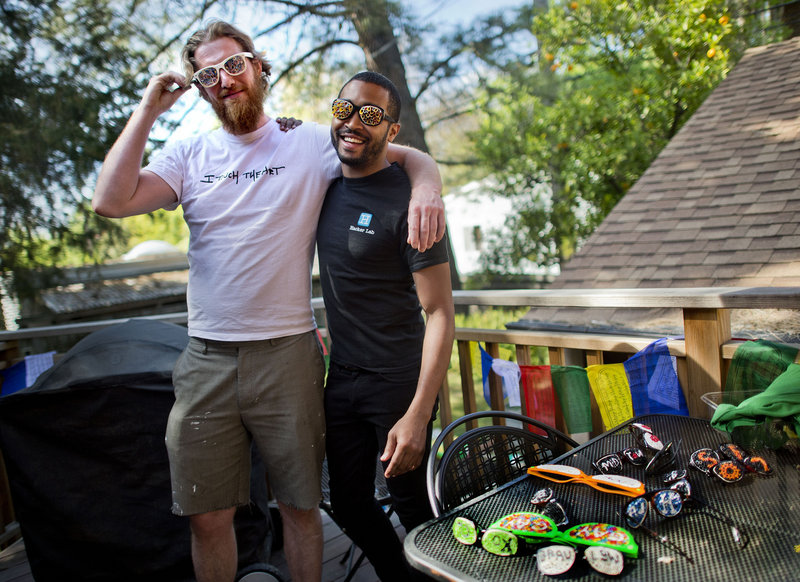To raise $15,000 for a new business venture, Sacramento, Calif., artist Danny Scheible went the route of many creative professionals: crowd funding. In a matter of weeks, his online appeal to launch a new line of quirky eyeglasses scooped up more than 200 interested donors.
In amounts ranging from $5 to $1,000, backers of his “Hacker Glasses” surpassed the initial goal, promising donations of more than $16,000.
For Tapigami, Scheible’s masking-tape art venture that’s moving into a new gallery space, raising money online was a natural.
“It’s the best designed system to fund any sort of creative project,” said Scheible, who has become a renowned young artist using a decidedly unconventional medium: masking tape. “There’s no other place where you can publicly ask for money and people feel comfortable contributing. It’s the best format out there for a creative person who doesn’t have a business background to get started.”
Crowd funding, on websites like IndieGoGo, Kickstarter and PeerBackers, has been around for several years, primarily as a low-key, grass-roots way for creative types — musicians, artists, filmmakers, writers and such — to gather donations for personal projects.
This year, crowd funding is poised to enter a new realm: small-business startups.
Under the federal Jumpstart Our Business Startups Act passed by Congress a year ago, crowd funding will be allowed by entrepreneurs who want to raise up to $1 million a year by selling shares to investors.
For startups and small businesses unable to find or afford conventional loans or stock offerings, it’s intended to spur job growth and eliminate the costly regulatory hurdles typically required for issuing stock in a company.
The only hang-up: The Securities and Exchange Commission was supposed to issue the new “equity crowd funding” regulations by Dec. 31, but has yet to do so.
Until then, as new crowd funding websites are poised to jump in, regulators are urging caution.
In general, the crowd funding-for-small-business concept is “a good thing,” encouraging job creation, economic growth and technology innovation, said California Department of Corporations spokesman Mark Leyes. “But we do have some cautions for folks on both sides: entrepreneurs and potential investors. There are risks and opportunities for abuse and fraud. People should be careful.”
With little state or federal oversight of the crowd funding offers, Leyes said, investors should do their due diligence, the same as with any online investment.
“There is endless speculation on how equity crowd funding is going to work, and hundreds of websites are waiting to launch to facilitate (it) once it’s legal,” said Laura Good, program and operations director for the Sacramento Regional Technology Alliance, in an email.
In the investment community, she noted, there are differing opinions “on whether or not equity crowd funding will be a good thing.” But, Good said, many of the technology entrepreneurs that her group works with consider it “a faster way to raise small amounts of capital from a larger pool of investors,” as well as an opportunity “for ‘average’ people to support the potential success of a startup they believe in.”
Scheible and his business manager Tre Borden, both 28, have been friends since their grade school days in Sacramento. The new funding moves their Hacker Glasses closer to production. The frames are being designed and 3-D printed by several local companies or individuals.
“It’s entry-level, commissioned artwork,” said Borden. “The fact that they’re locally designed and 3-D printed — and wearable — makes them all the more cutting-edge and compelling.”
With Scheible’s colorful, tape-art lenses that are custom designed for each buyer, the glasses will sell for about $300 each. (And yes, to answer Tapigami’s most-frequently-asked question: You can see through them, but vision is limited.)
“They’re not sunglasses; they’re ‘fun’ glasses,” said Borden. He and Scheible envision buyers wearing them to events, using them in company advertising, displaying them like artwork. The prototypes feature San Francisco Giants, Track 7 brewery and other business or personal logos.
Aside from getting their Hacker Glasses on the market, the partners’ other immediate focus is readying their first full-time gallery, artist’s studio and storefront space. It’s scheduled to open May 11 at Sacramento’s Downtown Plaza mall, inside a recently vacated Hyundai dealership.
Getting online financial backing is essential to entrepreneurs who don’t fit inside conventional boxes.
“It’s a launching pad,” said Borden, who earned a Yale degree and an MBA in entrepreneurship from the University of California-Davis.
“At this point, we wouldn’t qualify for a huge capital loan, nor would we want to. … Right now, we’re only responsible to the people who believe in us.”
But conventional funding could lie ahead.
“The whole starving artist concept is outdated,” notes Borden. “Too often we don’t pair the arts with economic vibrancy. We want to change people’s perspectives.”
Send questions/comments to the editors.



Success. Please wait for the page to reload. If the page does not reload within 5 seconds, please refresh the page.
Enter your email and password to access comments.
Hi, to comment on stories you must . This profile is in addition to your subscription and website login.
Already have a commenting profile? .
Invalid username/password.
Please check your email to confirm and complete your registration.
Only subscribers are eligible to post comments. Please subscribe or login first for digital access. Here’s why.
Use the form below to reset your password. When you've submitted your account email, we will send an email with a reset code.